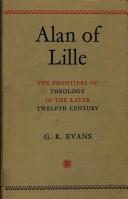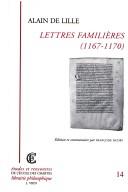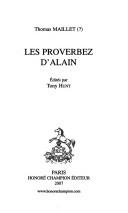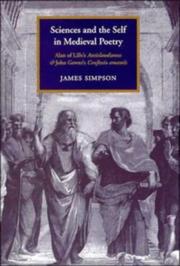| Listing 1 - 10 of 13 | << page >> |
Sort by
|
Book
ISBN: 019009138X 9780190091385 Year: 2021 Publisher: New York Oxford University Press
Abstract | Keywords | Export | Availability | Bookmark
 Loading...
Loading...Choose an application
- Reference Manager
- EndNote
- RefWorks (Direct export to RefWorks)
This text considers how ancient and medieval commentaries on the Aeneid by Servius, Fulgentius, Bernard Silvestris, and others can give us new insights into four twelfth-century Latin epics - the Ylias by Joseph of Exeter, the Alexandreis by Walter of Chtillon, the Anticlaudianus by Alan of Lille, and the Architrenius by John of Hauville. Virgil's influence on twelfth-century Latin epic is generally thought to be limited to verbal echoes and occasional narrative episodes, but evidence is presented that more global influences have been overlooked because ancient and medieval interpretations of the Aeneid, as preserved by the commentaries, were often radically different from modern readings of the Aeneid. By explaining how to interpret the Aeneid, these commentaries directly influenced the way in which twelfth-century Latin epic imitated the Aeneid.
Book
ISBN: 9783451287091 Year: 2009 Publisher: Freiburg Herder
Abstract | Keywords | Export | Availability | Bookmark
 Loading...
Loading...Choose an application
- Reference Manager
- EndNote
- RefWorks (Direct export to RefWorks)

ISBN: 0521246180 0521094267 0511555229 051186776X 9780521246187 9780511555220 9780521094269 Year: 1983 Publisher: Cambridge Cambridge University press
Abstract | Keywords | Export | Availability | Bookmark
 Loading...
Loading...Choose an application
- Reference Manager
- EndNote
- RefWorks (Direct export to RefWorks)
Alan of Lille was a notable figure in the second half of the twelfth century as a theologian and as a poet and he has seemed as rich and individual a writer to modern scholars as he did to his own contemporaries. This study examines his work as a whole, in an attempt to set his well-known literary achievement in the context of his theological writings. He was in many ways a pioneer, an experimenter with several of the new genres of his day, an innovator both as a teacher and as an author. He was not an original thinker so much as an eclectic, drawing on a wide range of the sources available to his contemporaries. He shows us what might be done by a lively-minded scholar with the resources of the day, within the schools of late twelfth-century France, to bring theology alive and make it interesting and challenging to his readers.
Christian theology --- Alan of Lille --- Theology --- Philosophers --- Theologians --- History --- Alanus, --- 2 ALANUS DE INSULIS --- -Christian theology --- Theology, Christian --- Christianity --- Religion --- Godsdienst. Theologie--ALANUS DE INSULIS --- -Theology --- -Godsdienst. Theologie--ALANUS DE INSULIS --- -2 ALANUS DE INSULIS --- 2 ALANUS DE INSULIS Godsdienst. Theologie--ALANUS DE INSULIS --- Arts and Humanities --- Theology - History - Middle Ages, 600-1500 --- Philosophers - France - Biography --- Theologians - France - Biography --- Alanus, - de Insulis, - -1202 --- Alain, --- Alan, --- Alanus de Insulis, --- Alano, --- Insulis, Alanus de, --- Isle, Alain de l', --- L'Isle, Alain de, --- Ryssel, Alain von, --- Montepessulano, Alanus de,
Book
ISBN: 9782503538495 9782503520155 2503520154 Year: 2005 Publisher: Turnhout Brepols
Abstract | Keywords | Export | Availability | Bookmark
 Loading...
Loading...Choose an application
- Reference Manager
- EndNote
- RefWorks (Direct export to RefWorks)
Né aux alentours de 1120, surnommé le «Docteur universel», Alain de Lille doit ce titre à ses talents de philosophe, de théologien, de prédicateur et de poète, ainsi qu’à l’étendue de ses connaissances. Celui dont l’épitaphe dit qu’«il a su tout ce que l’homme pouvait savoir» est à lui seul un résumé des intérêts multiples de son temps. Sa pensée est le point de rencontre des grands courants philosophico-théologiques du XIIe siècle; au fait des dernières avancées techniques dans les arts libéraux, il demeure en même temps un parfait témoin de l’humanisme littéraire. A l’occasion du huitième centenaire de sa mort, il était nécessaire de réexplorer la synthèse qu’a opérée Alain des savoirs de cette époque charnière, et de rappeler les pistes et les problématiques qu’il a ouvertes, peu avant le grand essor universitaire du XIIIe siècle.
Philosophy, Medieval --- Philosophie médiévale --- Alanus, --- Alain, --- Mediaeval philosophy --- 12th century --- Criticism --- Alanus, de Insulis, - d. 1202.
Book
ISBN: 2503520154 9782503520155 Year: 2005 Volume: 12 Publisher: Turnhout Brepols
Abstract | Keywords | Export | Availability | Bookmark
 Loading...
Loading...Choose an application
- Reference Manager
- EndNote
- RefWorks (Direct export to RefWorks)
Né aux alentours de 1120, surnommé le " Docteur universel ", Alain de Lille doit ce titre à ses talents de philosophe, de théologien, de prédicateur et de poète, ainsi qu'à l'étendue de ses connaissances. Celui dont l'épitaphe dit qu' "il a su tout ce que l'homme pouvait savoir" est à lui seul un résumé des intérêts multiples de son temps. Sa pensée est le point de rencontre des grands courants philosophico-théologiques du XIIe siècle ; au fait des dernières avancées techniques dans les arts libéraux, il demeure en même temps un parfait témoin de l'humanisme littéraire. A l'occasion du huitième centenaire de sa mort, il était nécessaire de réexplorer la synthèse qu'a opérée Alain des savoirs de cette époque charnière, et de rappeler les pistes et les problématiques qu'il a ouvertes, peu avant le grand essor universitaire du XIIIe siècle.
Alan of Lille --- Philosophy, Medieval --- Alanus, de Insulis, --- Philosophie médiévale --- Alain de Lille --- Alanus van Rijsel --- Colloques --- Colloquia --- Filosofie van de Middeleeuwen --- Philosophie du Moyen Age --- Philosophie médiévale --- Congresses --- Congrès --- Alanus, --- Alain, --- Alan, --- Alanus de Insulis, --- Alano, --- Insulis, Alanus de, --- Isle, Alain de l', --- L'Isle, Alain de, --- Ryssel, Alain von, --- Montepessulano, Alanus de, --- Alanus, de Insulis, - d. 1202.

ISBN: 2900791618 2711643320 2711643328 9782900791615 9782711643325 Year: 2003 Volume: 14 Publisher: Paris: Vrin,
Abstract | Keywords | Export | Availability | Bookmark
 Loading...
Loading...Choose an application
- Reference Manager
- EndNote
- RefWorks (Direct export to RefWorks)
Reprenant l'édition de ces lettres anonymes, Françoise Hudry nous propose, au terme d'une minutieuse enquête, de les attribuer à Alain de Lille, ce qui rendrait compte également de l'ancienne identification de celui-ci avec Alain de Canterbury qui fut ensuite abbé de Tewkesburry. Ainsi, interprétées, par une analyse à la fois historique et culturelle, ces lettres contribuent à redessiner une partie de l'histoire culturelle du XIIe siècle : elles élucident des pans d'ombre de la biographie d'Alain de Lille, précisent ses liens avec Pierre de Blois ou Richard de Saint-Victor, éclairent le contexte dans lequel Alain écrivit un De planctu Naturae plein d'amertume ; elles permettent également de mieux comprendre les relations entre différents textes de cette période, suggérant par exemple des rapports subtils et complexes entre la satire de Nigel de Longchamp et l'œuvre d'Alain de Lille... Le dossier est à présent entre les mains des lecteurs, avec le drame humain qu'il desssine, quel que soit le protagoniste.
Bibliothèque nationale de France. Handschrift. Latijn 13575 --- Bibliothèque nationale de France. Manuscript. Latin 13575 --- Bibliothèque nationale de France. Manuscrit. Latin 13575 --- Philosophers, Medieval --- Philosophes médiévaux --- Correspondence --- Correspondance --- Alanus, --- Philosophes médiévaux --- Alanus de Insulis --- Authorship --- Alanus, - de Insulis, - d. 1202 --- ALAIN DE LILLE, 1115?-1202? --- CRITIQUE ET INTERPRETATION --- CORRESPONDANCE
Book
ISBN: 3261015810 Year: 1975 Publisher: Bern Lang
Abstract | Keywords | Export | Availability | Bookmark
 Loading...
Loading...Choose an application
- Reference Manager
- EndNote
- RefWorks (Direct export to RefWorks)
Epic poetry, Latin (Medieval and modern) --- -Man in literature --- Philosophy, Medieval, in literature --- Man in literature --- History and criticism --- Alanus de Insulis --- Goethe, Johann Wolfgang von --- Hafiz --- -Criticism and interpretation --- Human beings in literature. --- Philosophy, Medieval, in literature. --- History and criticism. --- Alanus, --- Alain de Lille --- Alano di Lilla --- Alanus ab Insulis --- Alanus de Insulis.
Book
ISBN: 9780190091361 0190091363 9780190091385 Year: 2021 Publisher: New York Oxford University Press
Abstract | Keywords | Export | Availability | Bookmark
 Loading...
Loading...Choose an application
- Reference Manager
- EndNote
- RefWorks (Direct export to RefWorks)
This text considers how ancient and medieval commentaries on the Aeneid by Servius, Fulgentius, Bernard Silvestris, and others can give us new insights into four twelfth-century Latin epics - the Ylias by Joseph of Exeter, the Alexandreis by Walter of Chtillon, the Anticlaudianus by Alan of Lille, and the Architrenius by John of Hauville. Virgil's influence on twelfth-century Latin epic is generally thought to be limited to verbal echoes and occasional narrative episodes, but evidence is presented that more global influences have been overlooked because ancient and medieval interpretations of the Aeneid, as preserved by the commentaries, were often radically different from modern readings of the Aeneid. By explaining how to interpret the Aeneid, these commentaries directly influenced the way in which twelfth-century Latin epic imitated the Aeneid.
Epic poetry, Latin (Medieval and modern) --- Allegory. --- History and criticism. --- Alanus, --- Johannes, --- Joseph, --- Walter, --- Virgil --- Virgil. --- Criticism and interpretation --- History --- Influence. --- Allegory --- Alanus, - de Insulis, - -1202. - Anticlaudianus --- Johannes, - de Hauvilla, - active 12th century. - Architrenius --- Joseph, - of Exeter, - -approximately 1224. - De bello Troiano --- Walter, - of Châtillon, - active 1170-1180. - Alexandreis --- Virgil. - Aeneis --- Anticlaudianus (Alanus, de Insulis)

ISBN: 9782745314598 2745314599 Year: 2007 Volume: 151 Publisher: Paris Champion
Abstract | Keywords | Export | Availability | Bookmark
 Loading...
Loading...Choose an application
- Reference Manager
- EndNote
- RefWorks (Direct export to RefWorks)
Il y a trois traductions en ancien français du Liber parabolarum d'Alain de Lille, dont la présente, jusqu'ici inédite, date de la fin du XIVe siècle et a toutes les probabilités d'être l'œuvre de Thomas Maillet, traducteur, dont on ne connaît d'ailleurs rien, de deux Facetus latins. Ce texte transmet la sagesse proverbiale, non sans des allusions mythologiques, et té moigne de la survivance des textes scolaires qui apparurent dans des manuels latins dits 'libri Catoniani' au XIIe siècle et qui sont restés en usage jusqu'à la Renaissance.
Old French literature --- Alanus, --- Proverbs --- Alain, --- Alan, --- Alanus de Insulis, --- Alano, --- Insulis, Alanus de, --- Isle, Alain de l', --- L'Isle, Alain de, --- Ryssel, Alain von, --- Montepessulano, Alanus de, --- Translations into French --- History and criticism. --- Proverbs - Poetry

ISBN: 0521471818 0521021111 0511518781 9780521021111 9780511518782 9780521471817 Year: 1995 Publisher: Cambridge Cambridge University Press
Abstract | Keywords | Export | Availability | Bookmark
 Loading...
Loading...Choose an application
- Reference Manager
- EndNote
- RefWorks (Direct export to RefWorks)
In this 1995 study James Simpson examines two great poems of the later medieval period, the Latin philosophical epic, Alan of Lille's Anticlaudianus (1181-3), and John Gower's English poem, The Confessio Amantis (1390-3). Simpson locates these works in a cultural context dominated by two kinds of literary humanism: the absolutist, whose philosophical mentor is Plato, whose literary model is Virgil and whose concept of the self is centred in the intellect, and the constitutionalist, whose classical models are Aristotle and Ovid and whose concept of the self resides in the mediatory power of the imagination. Both poems are examples of the Bildungsroman, in which the self reaches its fullness only by traversing an educational cursus in the related sciences of ethics, politics and cosmology, but as this study shows, there are very different modes of thought behind their conceptions of selfhood and education.
Comparative literature --- Gower, John --- Alan of Lille --- Amour dans la littérature --- Filosofie [Middeleeuwse ] in de literatuur --- Humanisten --- Humanistes --- Humanists --- Ik in de literatuur --- Liefde in de literatuur --- Love in literature --- Moi dans la littérature --- Philosophie médiévale dans la littérature --- Philosophy [Medieval ] in literature --- Self in literature --- Epic poetry, Latin (Medieval and modern) --- -Humanists --- Literature and science --- -Literature, Comparative --- -Love in literature --- Philosophy, Medieval, in literature --- Poetry, Medieval --- -Poetry, Medieval --- -Self in literature --- European poetry --- Medieval poetry --- Literature, Comparative --- Philology --- Poetry and science --- Science and literature --- Science and poetry --- Science and the humanities --- Scholars --- History and criticism --- History --- English (Middle) and Latin (Medieval and modern) --- Latin (Medieval and modern) and English (Middle) --- Classical influences --- Alanus de Insulis --- Humanists. --- Love in literature. --- Philosophy, Medieval, in literature. --- Self in literature. --- English and Latin (Medieval and modern) --- Latin (Medieval and modern) and English. --- History and criticism. --- History. --- Classical influences. --- Alanus, --- Gower, John, --- Europe --- Intellectual life --- Alain de Lille --- Alano di Lilla --- Alanus ab Insulis --- English and Latin (Medieval and modern). --- English (Middle) and Latin (Medieval and modern). --- Latin (Medieval and modern) and English (Middle). --- Soi dans la littérature --- Zelf in de literatuur --- Latin (Medieval and modern) and English --- Council of Europe countries --- Eastern Hemisphere --- Eurasia --- Poetry [Medieval ] --- Epic poetry [Latin ] (Medieval and modern) --- Literature [Comparative ] --- Literature, Comparative - Latin (Medieval and modern) and English (Middle) --- Literature, Comparative - English (Middle) and Latin (Medieval and modern) --- Epic poetry, Latin (Medieval and modern) - History and criticism. --- Literature and science - Europe - History. --- Poetry, Medieval - Classical influences. --- Arts and Humanities --- Literature --- Literature, Comparative - Latin (Medieval and modern) and English. --- Poetry, Medieval - History and criticism. --- Alanus, - de Insulis, - d. 1202. - Anticlaudianus. --- Gower, John, - 1325?-1408. - Confessio amantis. --- MEDIEVAL POETRY --- ALANUS DE INSULIS, d. 1203 --- EPIC POETRY --- GOWER (JOHN), c. 1330-1408 --- LITERATURE AND SCIENCE --- LATIN --- CONFESSIO AMANTIS
| Listing 1 - 10 of 13 | << page >> |
Sort by
|

 Search
Search Feedback
Feedback About UniCat
About UniCat  Help
Help News
News